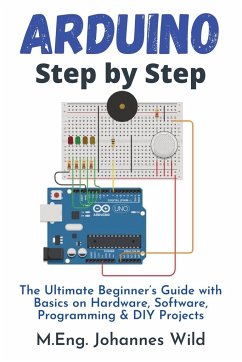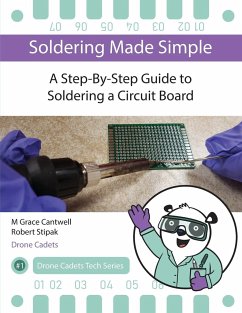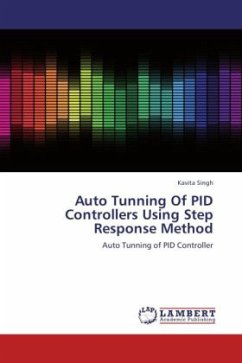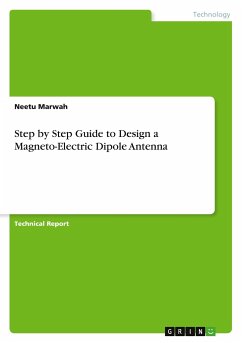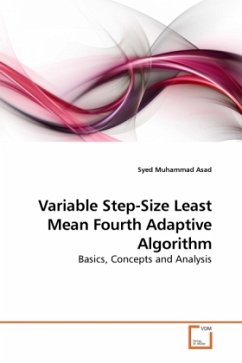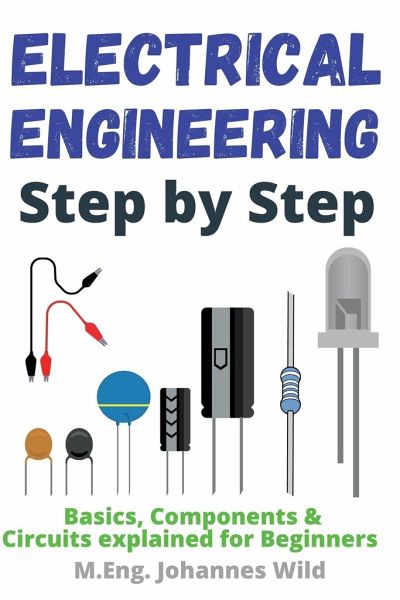
Electrical Engineering Step by Step
Basics, Components & Circuits explained for Beginners

PAYBACK Punkte
10 °P sammeln!
Are you looking for a simple and understandable introduction to the basics of electrical engineering and electronics? Then this book is for you! As an engineer (M.Eng.), I would like to teach you the basics of electrical engineering and electronics. This book offers you an easy-to-understand, intuitively structured, and practical introduction to the world of electrical engineering! What is current and voltage? What is charge? What is power and what is 1 kWh? How does an electric motor work? What is the difference between direct and alternating current? This electrical engineering handbook give...
Are you looking for a simple and understandable introduction to the basics of electrical engineering and electronics? Then this book is for you! As an engineer (M.Eng.), I would like to teach you the basics of electrical engineering and electronics. This book offers you an easy-to-understand, intuitively structured, and practical introduction to the world of electrical engineering! What is current and voltage? What is charge? What is power and what is 1 kWh? How does an electric motor work? What is the difference between direct and alternating current? This electrical engineering handbook gives answers to all these questions, and covers many other topics in depth and detail. In addition, this compact beginner's guide will quickly and easily teach you the functions and applications of important electronic components such as resistors, diodes, transistors, capacitors, and much more. This book offers you a comprehensive yet compact introduction to the basics of electrical engineering and electronics! In addition to important basic terms and principles, you will learn how to analyze circuits (Kirchhoff's Laws), what a bipolar transistor is, what a MOSFET is, and how an RLC circuit is designed. We will also look at what happens when you place an inductor in a magnetic field, and what practical applications these basic principles have in our modern world. Of course, we will also do some calculations and learn the mathematical equations behind the basic principles of electrical engineering in each chapter. However, depending on how deep you want to go into the material, you could also skip the mathematical parts. This Fundamentals book is intended for anyone who has no prior knowledge of electrical and electronic engineering, or who has some knowledge but is looking for a practical and understandable guide. No matter what age you are, what profession you have, whether you are a student, an employee, or a retiree. This book is for anyone who wants or needs to learn about electrical engineering and electronics. The goal of this book is to introduce you to how electrical engineering accompanies us in our daily lives and the basic principles involved. In addition, you will learn the basics of DC and AC technology, their theoretical background, and much more! Develop a basic understanding of electrical engineering and electronics in no time! So, do not hesitate any longer, take a look inside and get your copy as ebook or paperback! Briefly summarized, you can learn the following in detail: - Basic concepts and basic quantities of electrical engineering - How to analyze and solve electrical engineering circuits - Ohm's Law, Ampere's Law and Farady's Law - Components such as resistor, diode (e.g. LED), transistor, capacitor, transformer, ..., and how they work and what they are used for - The difference between direct current and alternating current, as well as single-phase and multi-phase systems - How does electricity enter the home? Getting to know the power supply system - Direct current and alternating current motors and their structure / mode of operation - Outlook: Renewable energy sources such as photovoltaic and wind power - and much more! Take a look inside and get your copy as an ebook or paperback!




